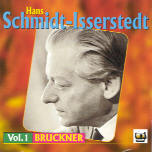Known almost exclusively for his work at the head of the North German Radio Symphony Orchestra, the ensemble he founded and conducted from 1945 to 1971, conductor Hans Schmidt-Isserstedt (1900-1973) left a small but representative recorded legacy. Taped in stereo in 1966 and 1968, these Bruckner symphonies show him at the peak of his career. There is nothing wrong in Schmidt-Isserstedt’s conducting, but nothing special either. His command over the disciplined but scarcely virtuoso orchestra doesn’t always match the music’s most intense and grandiose moments. Furthermore, the upfront recording flattens the dynamics and produces a foggy, indistinct sound that drowns a good deal of the winds’ numerous solos. The tempos are on the conservative side, neither too fast nor too slow, except in the Andante quasi allegretto of the “Romantic” symphony, taken at a processional pace closer to Adagio. The 7th lacks dynamic contrast, attention to detail and, above all, the long breadth of line that this cosmic music requires. To Schmidt-Isserstedt’s credit, let’s mention the successfully elegiac climate he manages to create in the Adagio. These performances probably helped in the diffusion of Bruckner’s symphonies when first broadcast on the famous, ubiquitous German post-war radio network. Today, tough competition has transformed their status: they’re at best historical documents for Brucknerian completists or compulsive record collectors. Böhm, Jochum, Wand, and several others have done better in this repertoire.
































